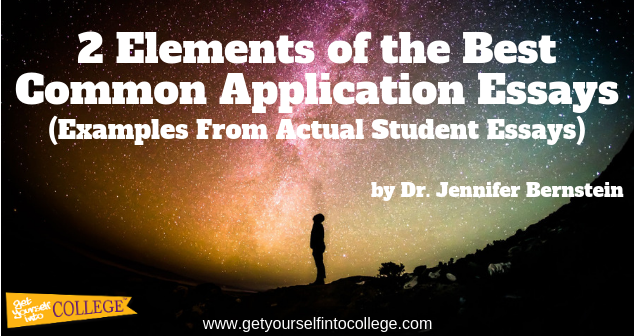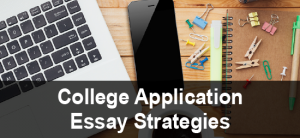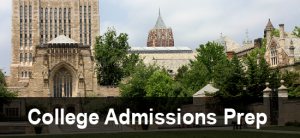The best Common Application essays provide admissions officers with valuable insight into you–your character, experiences, and perspectives. They’re also memorable. At the end of a long day or night of poring over application packages, great essays still linger in the minds of readers.
You’ve probably heard these two points many times, but what does it actually take to create a one-of-a-kind college application essay? How can you figure out what aspects of yourself to share in your Common Application essay? What will make your essay memorable?
I’m sharing case studies of multiple students to help you understand how to craft insightful and memorable application essays.
The Best Common Application Essays Are Not Flashy, Full of Brags, and Super Dramatic
The Common Application essay prompts invite you to share things about your background, experiences, interests, talents, identity, ideas, beliefs, and/or setbacks.
However, you’re not just writing an essay about yourself for yourself. You’re writing for a very specific audience–college admissions officers who are trying to figure out whether or not to accept you into their intellectual and social community.
That DOESN’T mean you should be focused on trying to tell admissions officers what you think they want to hear.
Every year, I read application essays that sound way too “goody-goody” or are filled with veiled brag alerts. I can tell that the students are “writing to” the admissions officers, which is a bad idea. These essays are boring and turn off readers.
Don’t get me wrong. I’m not saying you can’t focus on an accomplishment in your Common Application essay, but you’ve got to come at it from the right angle.
Also, too many students are obsessed with pumping up the drama. The best Common Application essays feature some form of inner and outer tension, but you’re not writing a soap opera.
Here’s the essential question you need to ask when considering ideas for your Common App essay: Why do admissions officers need to know this about me?
Let’s consider some examples.
Common App Essay Example for Engineering
If you’re applying to engineering programs and have to write a supplemental essay about your specific intellectual and professional interests in engineering, you might want to write your main application essay (which tends to be more general and more obviously personal than a supplemental essay), about a meaningful experience that demonstrates your problem-solving skills. After all, engineering programs are looking for students who have this underlying skill.
One of my students wrote a fascinating essay about how the complicated technical problems she solved as a member of her engineering team paled in comparison with the ones she faced when designing a series of workshops for middle school students with a broad range of disabilities.The essay wasn’t focused on bragging about this significant leadership experience. It wasn’t even mainly about the experience of the kids (although there was a great anecdote about them). Rather, her main focus was on her process of testing out, revising, and developing projects that would work well for the kids. Readers gained insight into her problem-solving skills (without her ever using that phrase) and her commitment to understanding the needs of those she was serving, another key quality of engineers.
It’s fine to write about an engineering project in your Common Application essay, but you need to avoid overlap between this essay and your supplemental essays.
Click here to read my article on applying to engineering programs.
Common App Essay Example for Science Student Accepted to Multiple Ivies
Let’s say you’re positioning yourself for the sciences. It’s possible that all your supplemental essays will focus on your scientific interests and experiences. In this case, you might want to use your Common Application essay to help admissions officers get to know other parts of you.
For instance, one of my STEM students who was accepted to Harvard, Princeton, Stanford, and MIT wrote his Common Application essay on the moment he discovered the connection between his interests in poetry and chemistry. The essay plunged readers into one mundane afternoon in his life when he was sitting on top of his truck and featured a few flashbacks and digressions, which helped admissions officers learn more about his writing, habits of mind, and experiments (poetic and scientific). Then, there was the turning point–the moment where a flash of insight pulsed across his consciousness–which helped him see underlying connections between these ways of thinking and modes of expression.
His main application essay thus helped readers get to know more about his poetic interests but also his day-to-day life, his ways of thinking, and the process behind some self-initiated experiments. There was no other place in his application package where readers would have learned these things about him. They added depth to his presentation of himself.
Had these students just been writing narratives about themselves for themselves, they might not have written about these particular topics, but they took into consideration their audience and the bigger picture of their applications to tell stories that were really important to them and, at the same time, connected with the needs of their audience. The best Common Application essays are always relevant in these ways.
Click here to read “Techniques Used in the Best College Application Essays.” This post includes a case study of an actual student essay and breaks down the different narrative strategies he used to help you learn how to incorporate similar techniques in your application essays.
The Best Common Application Essays Are Memorable
When reviewing student essays, I always comment on their memorability. Admissions officers are reading hundreds–sometimes thousands–of application essays each year. You don’t want to be part of the blur in their mind. You want to have an effect on admissions officers.
I’m reminded of how a Harvard student “brought the crowded Lowell House dining hall. . .to stunned silence and then catharsis.” Her story was so humble. . .so real. . .so poignant. Imagine being able to make this kind of mark in the minds and hearts of your admissions officers. Click here to read my article on “How Harvard Can Help You Write an Amazing Common App Essay” and then scroll down to the examples of student narratives. You can also check out this student’s talk by clicking here.
Unfortunately, so many Common App essays are, in the end, forgettable. Even some of the brightest students wind up selecting topics that a reader will almost immediately forget.
How to Bore Admissions Officers
One of my students who is now at MIT sent me an essay on a time he overcame a setback in a chess game. The structure was fine, the anecdotes were good, and I could see what was going on externally in the game and internally in his mind. On some level, this was a good essay. However, it was totally forgettable.
I hate to say that because I know that experience was important to the student, and I know he worked hard on writing the essay. But I quickly forgot what he wrote about. All I remembered was that he faced a difficult opponent and had to overcome the mindset that was getting in his way of strategizing. I’ve read hundreds of these kinds of essays before. The external details were different, but the overall structure and underlying message or lesson were the same.
Sometimes the way you tell the story can make all the difference. Sometimes what your reader will remember are your amazingly vivid and thought-provoking scenes (rather than the takeaway message).
In this case, I didn’t feel there was anything the student could do to transform the narrative into something that showcased things which are truly special about him. I happened to know this student quite well and quickly pointed out something else he’d done (and written about for another application) that was far more interesting and important.
How Can You Intrigue Admissions Officers?
Sometimes the Common Application essay prompts steer your brain into coming up with forgettable topics.
Remember that the Common App tries to “make sure that every applicant can find a home within the essay prompts,” which means they develop a series of topics that connect with most students’ experiences. The problem, though, is that if you start with the essay prompts rather than with yourself and what you feel is important for admissions officers to know about you, you’ll likely wind up focusing on something really common.
- Think about possible “twists” on the Common App essay topics. For instance, the wording for the “Questioned or Challenged a Belief or Idea” essay prompt leads many students into immediately thinking about challenging other people. Of course, you can write an amazing essay about this kind of challenging or questioning, but you might want to explore twists like writing about a time when you challenged one of your own self-limiting beliefs.
- The mundane can be magical. Don’t overlook the value of taking admissions officers deep into your world by sharing with them a ritual, a habit, or some other part of your life. Admissions officers are very curious and want to get to know you.
One of my students wrote an amazing essay about the evolution of an annual family ritual, which also shed light on her technical prowess, her transition from being the kid helping out to the leader organizing and revamping the ritual, and even how the ritual connected to her community.
I’ve read wonderful essays about getting to know a veteran through a service project and how this relationship profoundly influenced the student’s way of thinking and acting, a student’s fascination with riddles and jokes, and a super organized student’s experience getting lost in a foreign country.
There are so many possibilities! Just don’t be gimmicky.
- Process is fascinating. The college application process tends to get you obsessed with your accomplishments, but don’t forget the middle! Let’s say you want to write about “a topic, idea, or concept you find so engaging that it makes you lose all track of time.” Come up with scenes that show (not just tell) you working on this idea. Maybe your mind was blown by a single sentence in a book you were reading that sparked a series of independent research projects. You could share the scene of you encountering that sentence, what made it so unsettling, and how your projects helped you work through the concepts. Even if these projects are listed and described elsewhere in your application package, you would be providing a behind-the-scenes perspective that would be interesting and valuable to admissions officers. Plus, no one else would be writing this same essay because the experience is unique.
There is no one right or wrong topic. You have to find the right angles to pursue, and that takes some time.
I’ll leave you with some words from Ralph Waldo Emerson’s essay “Experience”:
“A man is like a bit of Labrador spar, which has no lustre as you turn it in your hand, until you come to a particular angle; then it shows deep and beautiful colors.”
If your goal is to write one of the best Common Application essays, you’ve got to turn your experiences around in your mind until you find that perfect angle, the one that reveals your “deep and beautiful colors” to admissions officers.
WAYS TO WORK WITH DR. BERNSTEIN!
Click here to learn how to schedule a private consultation with Dr. Bernstein.
Click here to learn more about Dr. Bernstein’s ongoing private college preparation and college admissions support.
Click here to learn about the online Get Yourself Into College® program.
Blog post image: ©Greg Rakozy/unsplash.com



